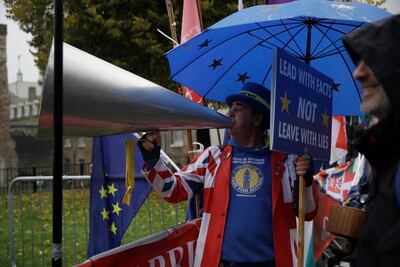In Northern Ireland, people are used to divisive, hard-fought elections. I am writing this in Belfast and when I lived in the city, there was an old joke that in politics, you should “vote early – and vote often". But it was not a joke. In bitterly fought contests, some voters would break the law to vote more than once.
Yet in a different way, the experience of this tiny part of the United Kingdom might offer some clues as to how the December 12 general election might unfold. Here in Belfast there are still "peace lines" – massive walls and barricades to keep Protestant and Catholic communities separate at flashpoints. Today the Troubles – the 30-year-long campaign of shootings and bombings that claimed more than 3,000 lives – has, thankfully, passed into history. There are still occasional outbreaks of violence but most people in Northern Ireland want to get along. Yet the election called by British Prime Minister Boris Johnson is dividing the UK in ways in which Northern Ireland's experiences might prove a useful guide. The biggest political sin here is to "split the vote". It is now about to happen in England and that needs a bit of explaining.
There are many different political parties in Northern Ireland but there only two political and religious tribes. Protestants mostly vote for unionist parties, those which celebrate the union of Northern Ireland as part of the UK. Catholics mostly vote for Irish nationalist groups who aspire to a united Ireland. Unionists and nationalists rarely vote for parties on “the other side”. And that’s where “splitting the vote” comes in.
Every one of Northern Ireland’s political constituencies is fairly evenly balanced. Small changes in the vote can make a big political difference to the result. If one unionist party candidate runs, for example, in north Belfast, then that seat will return a unionist. But if a second unionist party fields a candidate, it will split the Protestant vote, allowing a single nationalist or Catholic politician to win in North Belfast. In majority Catholic areas, the same is true in reverse. All this means that tribal identity – Catholic and nationalist, versus Protestant and unionist – trumps party affiliation.
In the rest of the UK, this idea of splitting the vote has rarely had much currency. Traditionally English voters tend to choose a party likely to provide the next prime minister – Conservative or Labour. Only a minority of voters choose smaller parties. But in this December election, all bets are off. Traditional battle lines are being destroyed because the Brexit debacle means England has two modern Brexit tribes that cut across party lines, Remain and Leave. Many Remain and Leave voters are now looking round to see which political party really reflects their new identities.
On the Remain side, there are Liberal Democrats, Greens and the majority of candidates from the Labour party. On the Leave side, there is Mr Johnson's Conservative party, some Labour candidates and now Nigel Farage's Brexit party. Even though this election is supposedly about more than Brexit, it will be the defining issue for a generation to come. Leave and Remain candidates risk splitting the vote for their tribes, allowing candidates from the other side to win. This is particularly dangerous for the prime minister. Mr Johnson promised to leave the EU, "do or die", by October 31. He has failed. He also promised that his deal to leave the EU means all kinds of wonderful free-trade agreements around the world are now negotiable. But Mr Farage disagrees and has thrown Mr Johnson's Brexit election strategy into disarray. The Brexit Party leader bluntly says Mr Johnson's Brexit deal with the EU is "not Brexit" because it will keep the UK tied to EU rules on food standards and other matters.
Mr Farage is half right. Leaving the European Union with Mr Johnson’s deal is of course a type of Brexit, but it is difficult to see how Mr Johnson can secure a new trade deal with the EU while also negotiating in any way he desires with other countries. Mr Farage is correct in saying any EU deal will tie the UK to some EU standards and rules.
The big question therefore is what “splitting the vote” will mean for the election result. No one knows. Almost anything is possible, even if pollsters put Mr Johnson on course to win a majority. If that happens and he delivers a form of Brexit, the Brexit Party is finished. But if Mr Farage splits the Leave vote significantly, the result of this largely unwanted Christmas election might be yet another hung parliament, with no clear winner.
That’s when the other bit of wisdom from Northern Ireland could kick in. If the UK ends up, after a third general election in four years, with no clear winner then we can look forward to two further referendums – one on Brexit and one on Scottish independence – and presumably yet another general election. Vote early and vote often is beginning to sound less of a joke and more of a warning.
Gavin Esler is a journalist, author and presenter



